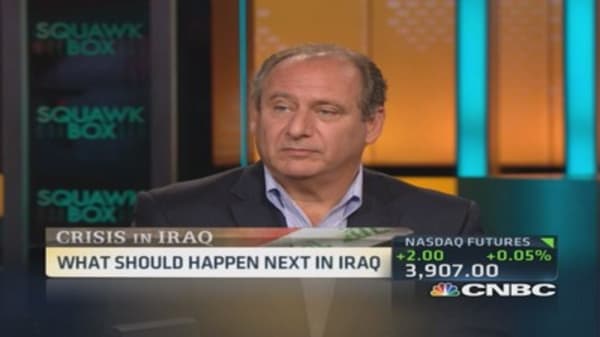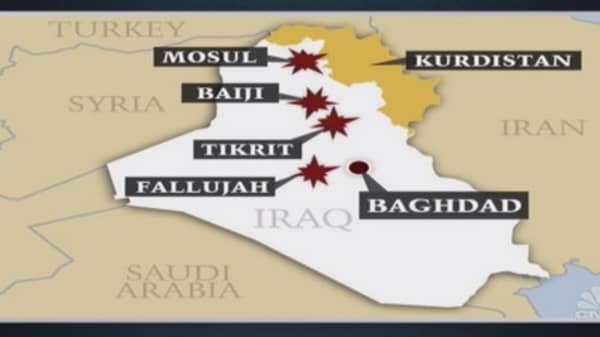U.S. air strikes against Islamic State fighters came just in time to save Irbil from being overrun. America's intervention saved thousands of lives. Beyond containing the current crisis, the Obama administration needs a long-term strategy to destroy the Islamic State and turn the tide against terrorism.
No one expected Islamic State fighters to sweep across Iraqi Kurdistan last week, vanquishing the vaunted Kurdish peshmerga — "those who face death." The Islamic State is well-armed with U.S. made have heavy weapons, tanks, artillery, rockets and armored vehicles, which it seized from the Iraqi Army when it abandoned Mosul on June 10. The peshmerga were simply outgunned. Each peshmerga had only 60 bullets.
Read MoreUS needs to arm the Kurds in Iraq: Phillips
The peshmerga are motivated and capable, when properly equipped. The United States should urgently launch a train-and-equip program to enhance the peshmarga's military capabilities. They desperately need ammunition, sniper rifles, machine guns, mortars, anti-tank weapons, vehicles, and APCs.
An extended air campaign can complement peshmerga ground forces, leveling the battlefield against Islamic State forces. Now that American reconnaissance planes and drones have intelligence on Islamic State troop movements, laser-guided bombs should take out their convoys, mortars and artillery. Peshmerga could also act as "spotters," identifying targets.
Stopping the advance of Islamic State fighters will create space for humanitarian action. As many as 40,000 Yazidi Kurds are clinging to life on Mt. Sinjar. They need relief — and rescue via a safe corridor to Syria.
Read MoreA grand bargain between Turkey and the Kurds
Over the past few days, U.S. cargo planes dropped rations and drinking water for Yazidis on Mount Sinjar. Emergency assistance helped save thousands of lives. Britain and France have promised to join the airlift, which is essential for saving lives. The international community has a "responsibility to protect" innocent civilians.
Iraq's neighbors must also participate; Turkey can play a critical role.
Turkish F-16s at Incirlik Air Force Base in Southeastern Turkey are just minutes from the battlefield. Incirlik can act as a logistics hub for international efforts to arm the Kurds, and for relief supplies. Turkey has experience in multilateral operations, having led NATO's International Security Assistance Force for Afghanistan. Given the "strategic partnership" between Turkey and the Kurdistan Regional Government, Turkey should be at the forefront of efforts to assist the Kurds.
Read MoreShould the US do more or less in Iraq?
Turkish Special Forces are already on the ground in Iraqi Kurdistan. They can act as a rapid reaction force to open a humanitarian corridor from Mount Sinjar to Syria. It is in Turkey's interest to take the lead. If Turkey does not act, the PKK and Kurdish militias from Syria fill the void.
Turkey recently established a camp inside Iraqi Kurdistan for Turkmen, ethnic brethren who fled when Islamic State fighters seized Tal Afar and Sengal. It should expand the camp for displaced persons, enforcing a safe area for both Turkmen and Yazidis.
Cash flows to the Islamic State can be shut down using proven techniques to intercede terrorist financing. Saudi Arabia, Qatar, and the United Arab Emirates back the Islamic State, providing financial support.
A regional security solution would also involve Iran. The Iraqi government, which is controlled by Iran, should seek Iranian support for operations against the Islamic State. Baghdad can provide its inclusive approach by supporting the Kurds and other northerners.
Read MoreUS bombs Iraq as Obama calls to prevent 'genocide'
When Obama addressed the nation to explain America's military action in Iraq, he cited the protection of U.S. officials at the consulate in Irbil. He underscored the need to prevent genocide of Christians and Yazidis. Obama also envisions a political solution, making all Iraqis stakeholders in the country's future. He hopes a new Iraqi government can address the concerns of Sunnis, turning them against the Islamic State.
Reconciliation is a noble cause. But if Iraqis cannot establish an inclusive government and Iraq falls apart, the United States will be obligated to defend the Kurds. Iraqi Kurdistan's independence may be the final outcome.
Commentary by David L. Phillips, director of the Program on Peace-building and Human Rights at Columbia University's Institute for the Study of Human Rights. He is a former senior adviser and foreign affairs expert to the U.S. Department of State during the administrations of Presidents Clinton, Bush and Obama. He is also author of the forthcoming book, "The Kurdish Spring: A New Map for the Middle East" (Transaction Publishers).





